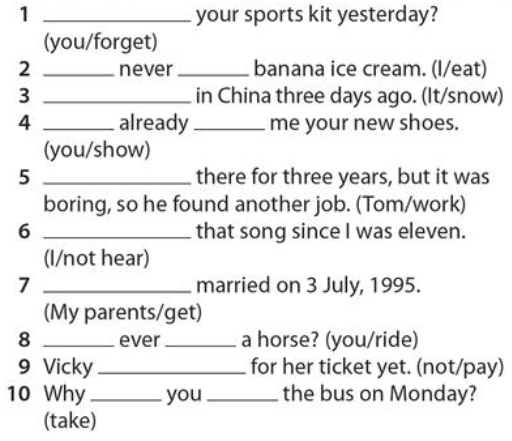Complete the sentences, using the present perfect or past simple form of the verbs in brackets

Những câu hỏi liên quan
Complete the sentences, using the present perfect or past simple form of the verbs in brackets
1. Did you forget
2. I have never eaten
3. It snowed
4. You have already shown
5. Tom had worked
6. I haven't heard
7. My parents got
8. Have you ever ridden
9. hasn't payed
10. did you take
Đúng 2
Bình luận (0)
Exercise 4. Complete the sentences. Use the past simple, present perfect or future passive form of the verbs in brackets.
1. The winning film at the festival last year ____________________ (direct) by James Cameron.
2. The results ____________________ (not send) to the students’ homes yet.
3. The book ____________________ (publish) by Oxford University Press next month.
4. We ____________________ (invite) to Tom and Gina’s wedding next April. I’m very excited!
5. The students ___________...
Đọc tiếp
Exercise 4. Complete the sentences. Use the past simple, present perfect or future passive form of the verbs in brackets.
1. The winning film at the festival last year ____________________ (direct) by James Cameron.
2. The results ____________________ (not send) to the students’ homes yet.
3. The book ____________________ (publish) by Oxford University Press next month.
4. We ____________________ (invite) to Tom and Gina’s wedding next April. I’m very excited!
5. The students ____________________ (tell) to read the book last week.
6. Thousands of copies of his biography ____________________ (sell) when it comes out next month.
7. They ____________________ (not give) the correct time for the meeting, so they arrived late.
1. was directed
2. weren't send
3. will be publish
4. will be invited
5. were told
6. will be sell
7. didn't give
Đúng 0
Bình luận (0)
Complete the sentences. Use the past simple or present perfect form of the verbs in brackets.1 Joe _________ (live) in London between 2009 and 2012.2 Emeli Sandé _________ (just/bring out) a new record. _________ (you/hear) it yet?Yes, I _________ (download) it last night.3 Sorry Im late! _________ (you/be) here long?No, I _________ (just/arrive).4 _________ (you/ever/visit) the USA? Yes, I _________ (go) there last summer.’5 _________ (you/eat) before you _________ (leave) home?Yes, I _______6...
Đọc tiếp
Complete the sentences. Use the past simple or present perfect form of the verbs in brackets.
1 Joe _________ (live) in London between 2009 and 2012.
2 'Emeli Sandé _________ (just/bring out) a new record. _________ (you/hear) it yet?'
'Yes, I _________ (download) it last night.'
3 'Sorry I'm late! _________ (you/be) here long?'
'No, I _________ (just/arrive).'
4 _________ (you/ever/visit) the USA?' 'Yes, I _________ (go) there last summer.’
5 _________ (you/eat) before you _________ (leave) home?'
'Yes, I _______
6 I _________ (have) this MP3 player for a year.
1 Joe lived (live) in London between 2009 and 2012.
(Joe sống ở London từ năm 2009 đến 2012.)
2 'Emeli Sandé has just brought out (just/bring out) a new record. Have you heard it (you/hear) it yet?'
'Yes, I downloaded (download) it last night.'
('Emeli Sandé vừa mang về một bản ghi. Bạn đã nghe chưa?'
'Vâng, tôi đã tải nó tối qua.')
3 'Sorry I'm late! Have you been (you/be) here long?'
'No, I have just arrived (just/arrive).'
('Xin lỗi tôi tới trễ! Anh ở đây lâu chưa?”
'Không, tôi vừa mới đến.')
4 Have you ever visited (you/ever/visit) the USA?' 'Yes, I went (go) there last summer.’
(Bạn đã bao giờ đến thăm Hoa Kỳ chưa?' 'Vâng, tôi đã đến đó vào mùa hè năm ngoái.')
5 Did you eat (you/eat) before you left (leave) home?'
'Yes, I did
(Bạn đã ăn trước khi bạn rời khỏi nhà hả?'
'Vâng, tôi đã ăn.')
6 I have had (have) this MP3 player for a year.
(Tôi đã có máy nghe nhạc MP3 này được một năm.)
Đúng 0
Bình luận (0)
B. Complete the sentences with the correct form of the Past Perfect Simple or the Past Perfect Continuous of the verbs in brackets. We were tired because we ………………………………….. (drive) for two hours.Anna ………………………………….. (not stop) studying all day. She didn’t even have one break.………………………………………….. (the archaeologists / discover) the tomb before they found the treasure?I ………………………………….. (analyse) the document for hours. That’s why I needed a rest.
Đọc tiếp
B. Complete the sentences with the correct form of the Past Perfect Simple or the Past Perfect Continuous of the verbs in brackets.
We were tired because we ………………………………….. (drive) for two hours.
Anna ………………………………….. (not stop) studying all day. She didn’t even have one break.
………………………………………….. (the archaeologists / discover) the tomb before they found the treasure?
I ………………………………….. (analyse) the document for hours. That’s why I needed a rest.
We were tired because we …………………had driven……………….. (drive) for two hours.
Anna …………………hadn't stopped……………….. (not stop) studying all day. She didn’t even have one break.
…………………………The archaeologists had discovered……………….. (the archaeologists / discover) the tomb before they found the treasure?
I ……………………had analysed…………….. (analyse) the document for hours. That’s why I needed a rest
Đúng 1
Bình luận (0)
We were tired because we …………………had been driving……………….. (drive) for two hours.
Anna …………………hadn't stopped……………….. (not stop) studying all day. She didn’t even have one break.
…………………………Had the archaeologists discovered……………….. (the archaeologists / discover) the tomb before they found the treasure?
I ……………………had analysed…………….. (analyse) the document for hours. That’s why I needed a rest
Đúng 0
Bình luận (0)
Complete the article above with the present perfect or past simple form of the verbs in brackets. Barbie boyJian Yang is in his thirties and collects dolls. So far, he 1___________ (spend) twenty years and over £250,000 on his collection, which includes 6,000 Barbie dolls. The youngman from Singapore 2___________(start) collecting Barbie dolls when he 3___________ (be) just thirteen. The first doll he 4___________ (buy) was the Great Shape model in...
Đọc tiếp
Complete the article above with the present perfect or past simple form of the verbs in brackets.
Barbie boy
Jian Yang is in his thirties and collects dolls. So far, he 1___________ (spend) twenty years and over £250,000 on his collection, which includes 6,000 Barbie dolls. The young
man from Singapore 2___________(start) collecting Barbie dolls when he 3___________ (be) just thirteen. The first doll he 4___________ (buy) was the 'Great Shape' model in a gym outfit and leg warmers. Jian buys dolls when he travels for work and 5___________ (purchase) 65 dolls on his last trip to New York. A while ago, a girlfriend 6___________ (walk out) on him because of his hobby. Apparently, she 7___________ (feel) threatened by his collection. Jian 8___________(find) that worrying, but now he accepts it.
1. has spent
2. started
3. was
4. bought
5. purchased
6. walked out
7. felt
8. found
Đúng 0
Bình luận (0)
Complete the following sentences with the correct form of the verbs in brackets: the past simple or the past perfect tense.Before he (wake up) , his mother (prepare) breakfast.We (go) to London last month.By the time the doctor (arrive) , the patient (die) .Before that day we (never/ think) of traveling to Japan.I (know) him a long time before I (meet) his family.It (be) cloudy for days before it (begin) to rain.The car (break) down last Sunday.Martha (tu...
Đọc tiếp
Complete the following sentences with the correct form of the verbs in brackets: the past simple or the past perfect tense.
Before he (wake up) , his mother (prepare) breakfast.
We (go) to London last month.
By the time the doctor (arrive) , the patient (die) .
Before that day we (never/ think) of traveling to Japan.
I (know) him a long time before I (meet) his family.
It (be) cloudy for days before it (begin) to rain.
The car (break) down last Sunday.
Martha (turn) off the light and (go) to bed.
He (buy) a new car last month, but he doesn't really like it.
The robbers (attack) him 20 minutes ago.
1 woke up/had prepared
2 went
3 had arrived/died
4 had never thought
5 had known/met
6 had been/began
7 broke
8 turned/went
9 bought
10 attacked
Đúng 2
Bình luận (0)
Complete the sentences. Use the present perfect simple or the present perfect continuous form of the verb in brackets.
How long (the police / look for) survivors now?
How long has the police been looking for(the police / look for) survivors now?
Đúng 0
Bình luận (1)
How long has the police been looking for survivors now?
Thì HTHT tiếp diễn em nhé
Đúng 1
Bình luận (0)
Complete the sentences with the correct past simple, past continuous or past perfect form of the verbs in brackets.1. We ____________ (move) house a lot while I____________ (grow up).2. After Joe ____________ (learn) to drive, he___________ (buy) a car.3. George ____________ (leave) school, ____________ (go) to university and____________ (study) engineering.4. My parents ____________ (get) engaged in 1990.5. They ____________ (fall) in love two years before, while they ____________ (work) in Lon...
Đọc tiếp
Complete the sentences with the correct past simple, past continuous or past perfect form of the verbs in brackets.
1. We ____________ (move) house a lot while I____________ (grow up).
2. After Joe ____________ (learn) to drive, he___________ (buy) a car.
3. George ____________ (leave) school, ____________ (go) to university and____________ (study) engineering.
4. My parents ____________ (get) engaged in 1990.
5. They ____________ (fall) in love two years before, while they ____________ (work) in London.
1 moved - was growing
2 had learned - bought
3 left - went - studied
4 got
5 had fallen - were working
Đúng 0
Bình luận (0)
Complete the sentences. Use the past simple or the past perfect form of the verbs in brackets.1 My uncle and aunt _________ (already/get engaged) before they _________(emigrate) to Australia.2 I _________(not/can) buy anything because I _________(forget) my wallet.3 Robert _________(be) upset because he _________ (split up) with his girlfriend.4 Kelly _________(start) her first business before she_________(leave) university.5 As soon as Sara _________(inherit) the money from her grandmother, she...
Đọc tiếp
Complete the sentences. Use the past simple or the past perfect form of the verbs in brackets.
1 My uncle and aunt _________ (already/get engaged) before they _________(emigrate) to Australia.
2 I _________(not/can) buy anything because I _________(forget) my wallet.
3 Robert _________(be) upset because he _________ (split up) with his girlfriend.
4 Kelly _________(start) her first business before she_________(leave) university.
5 As soon as Sara _________(inherit) the money from her grandmother, she _________(buy) a car.
6 By the time Joe _________(retire), he_________(become) a grandfather.
7 After Fred _________ (settle down) in London, he _________(decide) to have a change of career.
8 We _________ (spend) the weekend moving house, so we _________ (go) to bed very early on Sunday.
1 My uncle and aunt had already got engaged (already/get engaged) before they emigrated (emigrate) to Australia.
(Chú và dì của tôi đã đính hôn trước khi họ di cư sang Úc.)
2 I couldn't (not/can) buy anything because I had forgotten (forget) my wallet.
(Tôi không thể mua bất cứ thứ gì vì tôi đã quên ví của mình.)
3 Robert was (be) upset because he had split up (split up) with his girlfriend.
(Robert rất buồn vì anh ấy đã chia tay bạn gái.)
4 Kelly had started (start) her first business before she left (leave) university.
(Kelly bắt đầu công việc kinh doanh đầu tiên trước khi rời trường đại học.)
5 As soon as Sara inherited (inherit) the money from her grandmother, she bought (buy) a car.
(Ngay sau khi Sara được thừa hưởng số tiền từ bà ngoại, cô ấy đã mua một chiếc ô tô.)
6 By the time Joe retired (retire), he had become (become) a grandfather.
(Vào thời điểm Joe nghỉ hưu, anh ấy đã trở thành ông ngoại.)
7 After Fred had settled down (settle down) in London, he decided (decide) to have a change of career.
(Sau khi Fred ổn định cuộc sống ở London, anh ấy quyết định thay đổi nghề nghiệp.)
8 We spent (spend) the weekend moving house, so we went (go) to bed very early on Sunday.
(Chúng tôi dành cả ngày cuối tuần để chuyển nhà, vì vậy chúng tôi đi ngủ rất sớm vào Chủ nhật.)
Đúng 0
Bình luận (0)




















